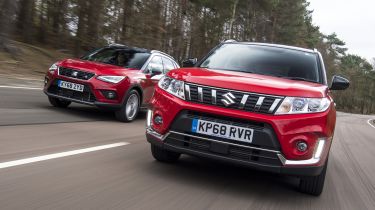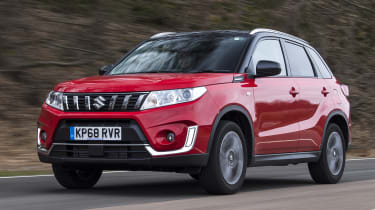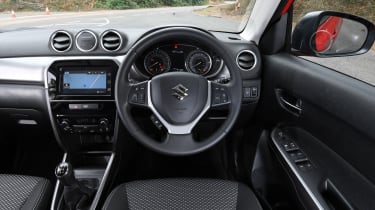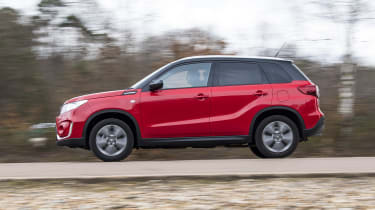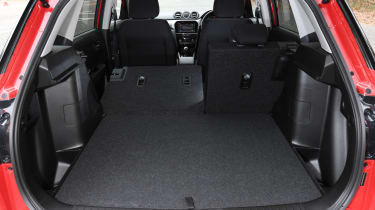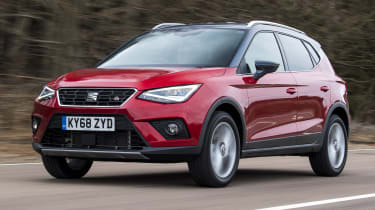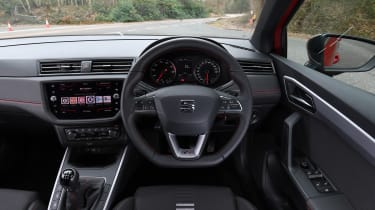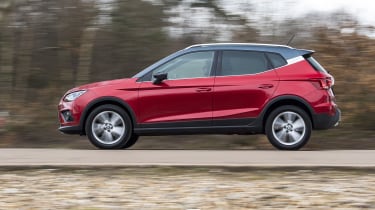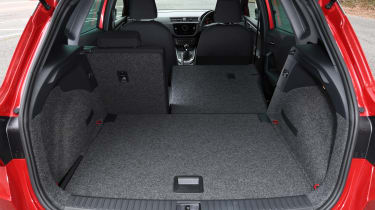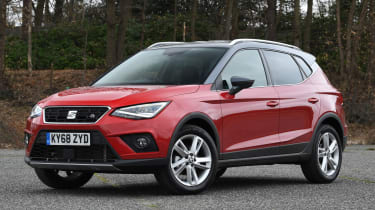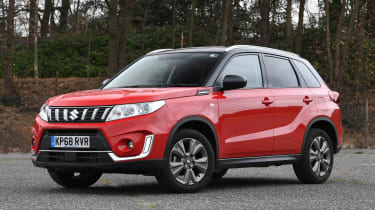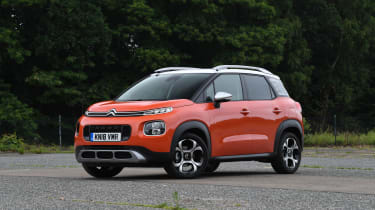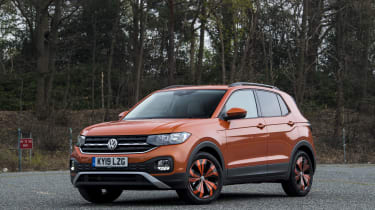Suzuki Vitara vs SEAT Arona
The latest Suzuki Vitara is supposedly the most advanced Suzuki ever, we test it against the class-leading SEAT Arona.
The pace of progress in the compact SUV sector means that if you’re standing still then, actually, you’re going backwards compared with your rivals. Suzuki knows this, which is why it’s updated its Vitara model with a new 1.0-litre petrol engine and extra equipment that the Japanese brand claims makes this “the most technically advanced Suzuki to date”.
It’s also subtly massaged the styling so the visuals match the upgrades elsewhere. But given how crowded this class is, it’s no surprise that the latest Vitara is faced with many talented competitors, the best of which is the SEAT Arona.
That’s the rival the Suzuki is up against here, so there’s nowhere to hide. We already know that the Arona delivers space and practicality mixed with fairly sharp driving dynamics, good refinement and a lot of technology in an affordable package. It’s slightly pricier than the Vitara as a cash buy, but PCP finance prices mean this isn’t the full story.
So do the Suzuki’s updates make it a more competitive machine? We test it in 1.0 Boosterjet SZ-T form to find out.
Suzuki Vitara
| Model: | Suzuki Vitara 1.0 Boosterjet SZ-T |
| Price: | £18,999 |
| Engine: | 1.0-litre 3cyl, 109bhp |
| 0-60mph: | 10.1 seconds |
| Test economy: | 42.5mpg/9.3mpl |
| CO2: | 121g/km |
| Annual road tax: | £140 |
There are some important tweaks to the Vitara that, according to the manufacturer, make the updated car “the most technically advanced Suzuki model to date”. We’re testing it in £18,999 1.0 Boosterjet SZ-T spec to see how much the brand has improved its offering.
Used - available now

2019 Suzuki
Vitara
41,093 milesAutomaticPetrol1.4L
Cash £13,500
2020 Suzuki
Vitara
48,581 milesManualPetrol1.4L
Cash £12,999
2019 Suzuki
Vitara
13,856 milesAutomaticPetrol1.4L
Cash £15,387
2020 Suzuki
Vitara
65,989 milesManualPetrol1.4L
Cash £13,513Design & engineering
Among the points that mean the Vitara lives up to Suzuki’s bold claim is the engine. It’s the brand’s 1.0-litre three-cylinder petrol turbo engine, which produces 109bhp and 170Nm of torque, mated to a five-speed manual gearbox. This is actually down on the Arona’s output, but the Vitara is 29kg lighter than the SEAT, so we’ll see how this affects performance.
There’s more to the revamp than just a new, more efficient engine, though. The styling has been tweaked to reflect this, but the bigger improvements have come with the addition of new safety technology to the range, which should improve the Vitara’s appeal as a family machine.
Part of Suzuki’s claim is also made up by the level of equipment on offer. All models now get climate control and Bluetooth, while SZ-T trim also brings sat-nav with Apple CarPlay and Android Auto, plus a reversing camera. However, this is about the limit of its kit; the Arona gets more standard features, even if the SEAT is a little pricier outright.
The Arona has a much higher-quality feel on the inside, which is where the Suzuki loses out. The dash plastics here are hard and there’s little visual flair to the design. It’s robust, but not very forgiving – and given that this car costs nearly £19,000, it doesn’t feel as good value. It’s not without merit, though, because while the interior might lack sparkle, the engineering underneath feels very solid.
Driving
The Suzuki steers nicely and rides relatively well – yet so does the SEAT. There’s some roll in the Vitara, but this means there’s also some compliance for mid-corner bumps. However, it’s no more comfortable than the SEAT and simply lacks the Arona’s last degree of precision, which also compromises comfort a little because the body isn’t as well controlled.
• Best small SUVs and crossovers to buy 2019
The Suzuki’s engine is quiet and isn’t so keen on being worked hard. Its five-speed manual means the new motor has to pull against taller gearing than the SEAT’s, and this, combined with its lower power and torque, meant it wasn’t as quick on test. The 0-60mph sprint took 10.1 seconds, 0.9 seconds slower than the Arona, but it’s the in-gear times that matter more in cars such as these. Between 30-50mph in third and fourth, it trailed the SEAT by 0.3 and 0.8 seconds respectively, posting times of 4.6 and 6.8 seconds. Meanwhile, at higher speeds in top gear between 50 and 70mph the deficit was greater, at 1.2 seconds – although that was in fifth in the Suzuki and sixth in the SEAT.
The Vitara’s engine refinement is good, because the motor is well suppressed when you rev it, but that means you hear a little more road and wind noise – and more so than in the Arona – so refinement isn’t quite on the same level. It’s important to point out that the addition of this 1.0 Boosterjet has made the Suzuki a more appealing car; it’s just that because this sector is so saturated, simply being okay isn’t enough. There are many rivals that are talented in many areas.
Practicality
While the 375-litre boot nearly matches the Arona’s offering, yet again the Vitara falls just short. There’s enough space inside the cabin, but nothing more than you’d expect from this size and type of car. At least the tall ride height and roofline mean it’s easy to get in and out of, and there’s enough headroom.
Legroom is acceptable, too, yet the cabin doesn’t feel any roomier than the SEAT’s, and it’s just a little less versatile as well. There’s a tray in front of the gear lever and a bin between the front seats, but the storage isn’t as thoughtful or as versatile as in the SEAT.
Ownership
Although more safety technology is available on this SZ-T trim, there is a caveat, because it’s standard only on four-wheel-drive Allgrip models. While all-wheel drive might make up a stronger proportion of Vitara sales than for other manufacturers, in this class its appeal is limited. This means that this front-wheel-drive SZ-T model doesn’t get some features even as options, which is a bit of a disappointment.
It still has a five-star Euro NCAP safety rating from its original crash test in 2015, but this front-wheel-drive SZ-T model merely gets seven airbags and ESC. The brand’s eighth-place rating in the makers’ chart of our Driver Power 2019 satisfaction survey at least suggests owners get on with their Suzukis. They ranked the firm well for reliability and running costs.
Running costs
The Vitara just edged ahead of the Arona for on-test fuel economy, returning 42.5mpg and highlighting that the addition of the 1.0-litre turbo engine is a positive when it comes to efficiency. It means you’ll spend around £1,637 a year on fuel, which is a respectably low amount.
But then, the SEAT managed only 0.4mpg less, at 42.1mpg, so it’ll just cost £1,652 to fuel over 12 months. There’s not much in it – and the same is true if you’re a fleet buyer, even though the Vitara’s 121g/km CO2 output puts it two Benefit-in-Kind taxation groups higher than the 114g/km Arona. Company car drivers should know that the Suzuki will cost £1,051 a year to run if you pay tax at the lower rate. The SEAT will set you back £1 less per year.
Testers’ notes: Suzuki owners might be looking to tow a trailer or caravan, but due to the Vitara’s downsized engine, the limit is 1,200kg. That’s the same maximum towing capacity as the Arona’s.
SEAT Arona
| Model: | SEAT Arona 1.0 TSI 115 FR |
| Price: | £20,410 |
| Engine: | 1.0-litre 3cyl, 113bhp |
| 0-60mph: | 9.2 seconds |
| Test economy: | 42.1mpg/9.3mpl |
| CO2: | 114g/km |
| Annual road tax: | £140 |
The Arona is one of our favourite compact SUVs and comes with a great 1.0-litre turbo unit. In £20,410 1.0 TSI 115 FR trim, this is the benchmark the new Vitara with its latest engine has to live up to. How does it fare compared with its rival?
Design & Engineering
SEAT’s small SUV is one element of the VW Group’s MQB masterplan. The Arona is based on this architecture, with a conventional MacPherson-strut front and torsion-beam rear end. As with the Suzuki, it sends its power to the front wheels. But unlike the Vitara, which can be specced with Allgrip all-wheel drive, the SEAT is available only with two-wheel drive. Most models in this sector don’t need the extra traction (not to mention the extra expense) of 4WD.
The Arona does get a six-speed manual gearbox as opposed to the Suzuki’s five-speed unit, though, while the 1.0-litre three-cylinder petrol turbo we’re testing here produces 113bhp and a healthy 200Nm of torque. As you’d expect, this gave the Arona a performance advantage during our test.
The SEAT also has an edge inside, because the cabin design is much more modern and interesting, yet it doesn’t sacrifice practicality. Quality is also slightly superior to the Suzuki’s; although the plastics are still hard in most places, it feels better built and more solid. FR trim is £1,411 more expensive than theSZ-T-spec Vitara, and it’s the lowest rung of the Arona ladder available with a powertrain comparable with the Suzuki’s – this 1.0 TSI 115 in manual form.
Given that the SEAT boasts better residual values, its higher price will be partly negated for most cash buyers by lower depreciation, while PCP purchasers will also benefit (see Through the Range, opposite). As you’d expect for the extra money you also get more equipment. LED lights, climate control, autonomous braking, wireless charging and parking sensors come on top of the Vitara’s level of standard kit, which includes sat-nav, Apple CarPlay and Android Auto among other items.
Considering the extra goodies you get – and that these features aren’t even available as options on the Suzuki in SZ-T trim – the SEAT looks like a strong proposition from a value perspective.
Driving
In every respect the Arona is better on the move than the Vitara. Firstly, the engine is punchier and more refined. The SEAT took 9.2 seconds to go from 0-60mph on test, while its stronger torque and little in the way of extra weight meant we also found it offered more in-gear flexibility at lower revs. As a result the car is more relaxing to drive, because you have to work the gearbox less and can rely on the smooth engine’s ability to pull from low down. However, if you do want to change down through the gears, the sweeter six-speed manual makes doing so much more fun than in the Suzuki. The more positive and rewarding shift action gives an impression that the SEAT feels more solid.
The suspension set-up is better balanced, too. It’s more settled over uneven, rough roads with better body control, so you can drive the car harder in corners and make the most of the extra grip. The ability of a small SUV at the limit isn’t that important, but because its ultimate limits are higher, most of the time the SEAT feels more settled and as if it has more in reserve, inspiring more confidence and delivering greater comfort.
Practicality
Part of the extra comfort over the Suzuki also comes from slightly more legroom in the rear and a nicer feel in the front of the cabin. And despite this extra space, the SEAT’s boot is bigger as well, at 400 litres, making the Arona a more practical car all round. Features such as the big storage tray in front of the gearlever – which doubles as a wireless charging tray for your mobile – plus two cup-holders mean the cabin feels tighter and more welcoming, but also more practical. It’s a clever feel, which SEAT has nailed. Beyond this, there aren’t too many more practical touches in the Arona. The Suzuki’s visibility is superior thanks to its boxier shape, but then the SEAT arguably looks better with that chunky C-pillar, which integrates well with the roof.
Ownership
The Arona gets more standard safety equipment of the two cars on test here, with autonomous braking featuring on all trim levels. This means it’s no surprise that the SEAT scored a full five-star Euro NCAP rating. It offers more protection than the Suzuki thanks to its more advanced safety systems. However, Suzuki turned the tables for brand satisfaction, finishing eighth in our Driver Power 2019 makers’ chart compared with 14th for SEAT.
The Japanese firm’s garage network also performed better according to owners, with a fourth-place result next to 18th for SEAT’s in our latest dealer poll.
Running costs
A stronger predicted residual value of 49.7 per cent means that private buyers of the SEAT will lose less cash over a typical three-year/36,000-mile ownership period, according to our finance experts. The Arona in 1.0 TSI 115 FR trim will shed £10,260 and therefore be worth £10,150, whereas the Suzuki (rated at 45.1 per cent residual value) will be worth a mere £8,574. Thanks to the extra safety equipment, the Arona is also cheaper to insure for our example driver, at a cost of £689 per year fully comprehensive compared with £725 for the Vitara.
Testers’ notes: Visibility might not be as good, but there’s scope to personalise the funkier design of the SEAT, just like in the Suzuki, with different roof colours and door mirror caps available here.
Verdict
First place: SEAT Arona
The Arona yet again shows why it’s one of the best compact SUVs around. Its engine is stronger yet more refined than the Suzuki’s new unit, plus the gearbox is better, while it’s also more comfortable and preferable to drive. On top of that, there’s superior infotainment and you get more space and kit – including safety tech. Only the higher price is a sticking point, but it’s less so on PCP finance.
Second place: Suzuki Vitara
There’s no doubt the Vitara is better for the addition of Suzuki’s 1.0-litre Boosterjet engine, but it’s a shame that the more popular two-wheel-drive version doesn’t get the top safety kit in SZ-T trim. It also lacks the higher-quality feel of the SEAT and doesn’t come as well equipped. And while it’s cheaper to buy, this is offset by its poorer practicality and higher running costs.
Also consider…
Citroen C3 Aircross
Model: Citroen C3 Aircross PureTech 110 FeelPrice: £17,855Engine: 1.2-litre 3cyl, 108bhp
The C3 Aircross is one of the most versatile small SUVs on sale with up to 520 litres of boot space on offer. The PureTech 110 engine is punchy enough, while the mostly smooth ride means it’s fairly comfortable. You get a decent level of kit, too.
Volkswagen T-Cross
Model: Volkswagen T-Cross 1.0 TSI 115 SEPrice: £19,555Engine: 1.0-litre 3cyl, 113bhp
It’s pricier still, but the T-Cross brings a bit of VW quality tothe small SUV market. There’s also extra practicality, thanks to up to 455 litres of boot space, and you can add tech, comfort and refinement to that list. SE trim brings everything you’d want.
Figures
| Suzuki Vitara | SEAT Arona | |
| 1.0 Boosterjet SZ-T | 1.0 TSI 115 FR | |
| On the road price/total as tested | £18,999/£18,999 | £20,410/£20,410 |
| Residual value (after 3yrs/36,000) | £8,574/45.1% | £10,150/49.7% |
| Depreciation | £10,425 | £10,260 |
| Annual tax liability std/higher rate | £1,051/£2,103 | £1,050/£2,099 |
| Annual fuel cost (12k/20k miles) | £1,637/£2,728 | £1,652/£2,754 |
| Insurance group/quote/VED | 12/£725/£140 | 12/£689/£140 |
| Cost of 1st/2nd/3rd service | £178/£282/£345 | £324 (2yrs) |
| Length/wheelbase | 4,175/2,500mm | 4,138/2,566mm |
| Height/width | 1,610/1,775mm | 1,543/1,780mm |
| Engine | 3cyl in-line/988cc | 3cyl in-line/999cc |
| Peak power/revs | 109/5,500 bhp/rpm | 113/5,000 bhp/rpm |
| Peak torque/revs | 170/2,000 Nm/rpm | 200/2,000 Nm/rpm |
| Transmission | 5-speed manual/fwd | 6-speed manual/fwd |
| Fuel tank capacity/spare wheel | 47 litres/space saver | 40 litres/£105 |
| Boot capacity (seats up/down) | 375/710 litres | 400 litres/N/A |
| Kerbweight/payload/towing weight | 1,160/570/1,200kg | 1,189/521/1,200kg |
| Turning circle | 10.4 metres | 10.6 metres |
| Basic warranty (miles)/recovery | 3yrs (60,000)/3yrs | 3yrs (60,000)/3yrs |
| Driver Power manufacturer/dealer pos. | 8th/4th* | 14th/18th* |
| NCAP: Adult/child/ped./assist/stars | 89/85/76/75/5 (2015) | 95/80/77/60/5 (2017) |
| 0-60/30-70mph | 10.1/9.9 secs | 9.2/9.1 secs |
| 30-50mph in 3rd/4th | 4.6/6.8 secs | 4.3/6.0 secs |
| 50-70mph in 5th/6th | 11.0 secs/N/A | 8.7/12.2 secs |
| Top speed/rpm at 70mph | 111mph/2,900rpm | 113mph/2,400rpm |
| Braking 70-0/60-0/30-0mph | 48.3/35.4/8.9m | 47.6/35.0/8.9m |
| Auto Express econ. (mpg/mpl)/range | 42.5/9.3/439 miles | 42.1/9.3/370 miles |
| WLTP combined mpg | 42.3-51.8mpg | 45.6-49.6mpg |
| WLTP combined mpl | 9.3-11.4mpl | 10.0-10.9mpl |
| Actual/claimed CO2/tax bracket | 154/121g/km/28% | 155/114g/km/26% |
| Airbags/Isofix/park sensors/camera | Seven/yes/no/yes | Six/yes/yes/no |
| Auto box/lane keep/blind spot/AEB | £1,350/no/no/no | £1,080/no/no/yes |
| Clim ctrl/cruise/leather/heated seats | Air-con/yes/no/no | Yes/yes/no/no |
| Metallic/LEDs/keyless/power tailgate | £500/no/no/no | Yes/yes/no/no |
| Nav/digi dash/DAB/connect services | Yes/no/yes/yes | Yes/no/yes/yes |
| Wireless charge/CarPlay/Android Auto | No/yes/yes | Yes/yes/yes |
